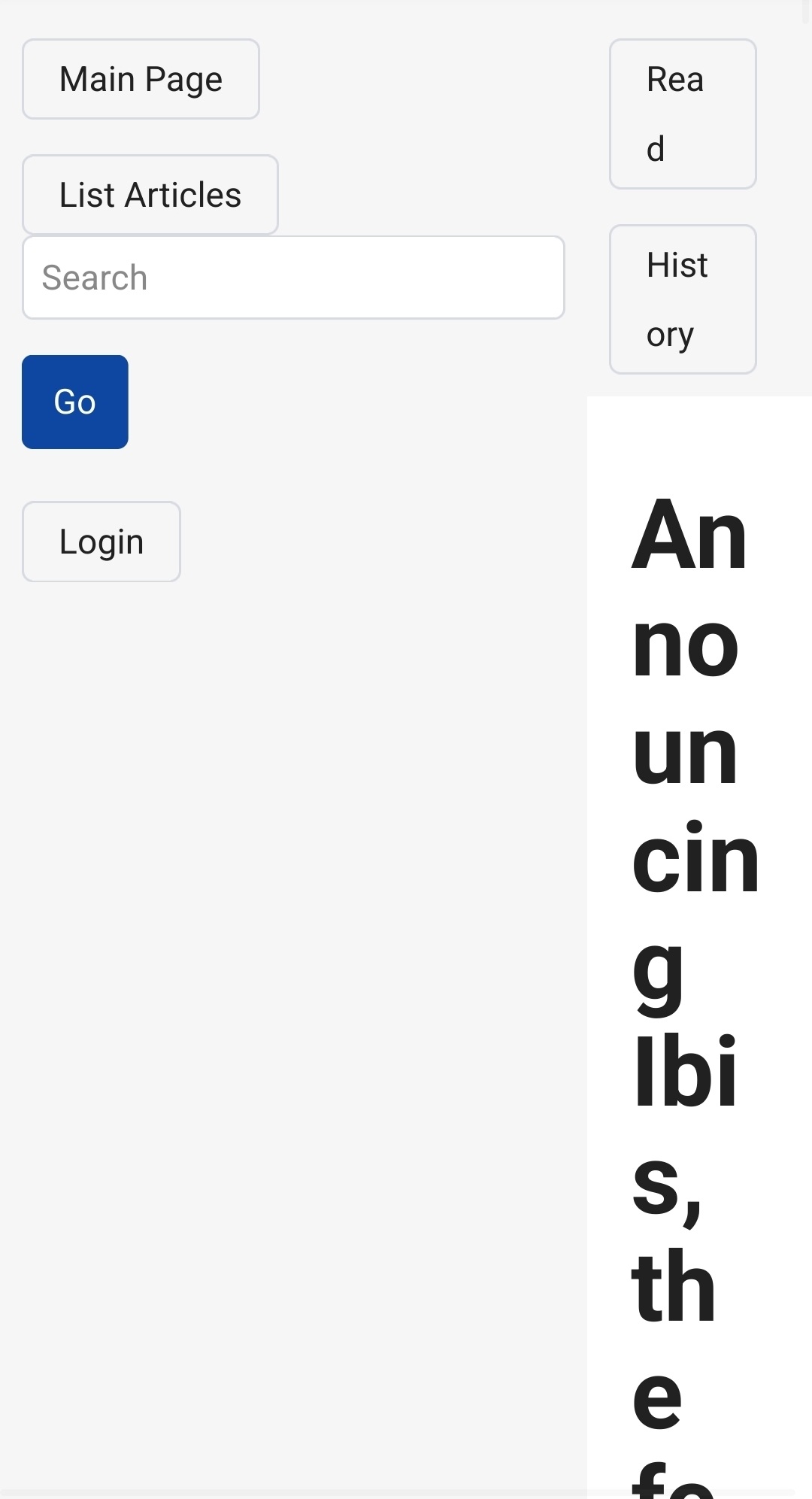I’m rather sceptical that this can work as a good alternative to Wikipedia. Wikipedia’s content moderation system is in my opinion both its greatest strength and its greatest weakness. To create a better Wikipedia, you would have to somehow innovate in that regard. I don’t think federation helps in any way with this problem. I do though see potential in Ibis for niche wikis which are currently mostly hosted on fandom.org. If you could create distinct wiki’s for different topics and allow them to interconnect when it makes sense, Ibis might have a chance there.
I’m going to use your comment to tell people to download Indie Wiki Buddy. It’s a plug-in for your browser that redirects Fandom to independent alternatives. I highly recommend it.
deleted by creator
If you think a centralized organization governed by legalism is opaque, just wait until you see a thousand islands of anarchy.
No I think it would actually be great. You could peek at two opposing views on the same article, for example. I’m sure some “instances” would be ripe with disinformation but what’s it to you? Idiots are already lapping up disinformation like candy. It’s not like wikipedia isn’t filled with it already…
You could peek at two opposing views on the same article, for example.
Post-truth as a service.
Post-truth as a service.
If you read through this page you might even conclude that Wikipedia itself is “post-truth”
https://en.wikipedia.org/wiki/List_of_Wikipedia_controversies
At any point in time you could be reading a defaced or propagandized version of an article.
Not only is the noise ratio low, this seems like a good lesson in “encyclopedias are not primary sources nor arbiters nor authorities on information.” Yes, people use Wikipedia that way anyway. No, baking in an even lower trust system does not seem like it’s actually a fix to any of Wikipedia’s problems.
Removed by mod
I don’t need opposing views on subjects, I need the most accurate one that’s the best researched and sourced.
Good thing Wikipedia articles are always the best researched and sourced!
In 2023, Jan Grabowski and Shira Klein published an article in the Journal of Holocaust Research in which they said they had discovered a “systematic, intentional distortion of Holocaust history” on the English-language Wikipedia.[367] Analysing 25 Wikipedia articles and almost 300 back pages (including talk pages, noticeboards and arbitration cases), Grabowski and Klein stated they have shown how a small group of editors managed to impose a fringe narrative on Polish-Jewish relations, informed by Polish nationalist propaganda and far removed from evidence-driven historical research. In addition to the article on the Warsaw concentration camp, the authors conclude that the activities of the editors’ group had an effect on several articles, such as History of the Jews in Poland, Rescue of Jews by Poles during the Holocaust and Jew with a coin. Nationalist editing on these and other articles allegedly included content ranging “from minor errors to subtle manipulations and outright lies”, examples of which the authors offer.[367]
- 367: Grabowski, Jan; Klein, Shira (February 9, 2023). “Wikipedia’s Intentional Distortion of the History of the Holocaust”. The Journal of Holocaust Research. 37 (2): 133–190. doi:10.1080/25785648.2023.2168939. ISSN 2578-5648. S2CID 257188267.
So? Is your alternative free of mistakes and bias?
I don’t think they’re suggesting wikipedia currently is “best researched and sourced,” just that a federated alternative wouldn’t automatically solve that issue.
I mean, much more often than not, and for the majority of the time, they are.
What’s the alternative you’re suggesting that would be comparably comprehensive but regularly more reliable…?
I mean, much more often than not, and for the majority of the time, they are.
You don’t see this statement as dogmatic? How do you feel confident in this other than just a feeling?
The majority of the time the articles would require actual expertise to make that evaluation with confidence. An individual can take a few minutes to verify the sources, but for so many topics it’s not realistic to rule out omissions of sources that should be well-known, or even rule out that a source given provides an important broader context somewhere nearby that should be mentioned in the article but isn’t. Can you be sure that the author is trustworthy on this subject? It’s not enough to just check a single page mentioned in a book while ignoring the rest of the book and any context surrounding the author.
An expert on a very specialized topic could weigh with accuracy in on whether the wikipedia articles on their subject is well-researched and sourced, but that still won’t mean they can extrapolate their conclusion to other articles.
…isn’t the good idea here to not enhance visibility of disinformation?
We’re talking about the fediverse here. It’s such a niche place and there are already wildly opposing views and information existing on Lemmy itself.
And that’s not even mentioning the situation on bigger social media platforms and the broader web!
deleted by creator
Considering some of the ungodly biased wikipedia alternatives I see tossed around on Lemmy, I’m not too confident Ibis will end up any better.
Besides, first I’m hearing of Wikipedia losing trust.
This feels like a hasty “solution” to an invented “problem”. Sure, Wikipedia isn’t squeaky clean, but it’s pretty damn good for something that people have been freely adding knowledge to for decades. The cherry-picked examples of what makes Wikipedia " bad" are really not outrageous enough to create something even more niche than Wikia, Fandom, or the late Encyclopedia Dramatica. I appreciate the thought, but federation is not a silver bullet for everything. Don’t glorify federation the way cryptobros glorify the block chain as the answer to all the problems of the world.
So you’re saying you want a federated wiki that uses a blockchain??? Genius.
Kidding aside, you’re absolutely right. Wikipedia is one of the very few if not ONLY examples of centralized tech that ISN’T absolute toxic garbage. Is it perfect? No. From what I understand, humans are involved in it, so, no, it’s not perfect.
If you want to federate some big ol toxic shit hole, Amazon, Netflix, any of Google’s many spywares – there’s loads of way more shitty things we would benefit from ditching.
Edit: the “federated Netflix” – I know it sounds weird, but I actually think it would be really cool. Think of it more like Nebula+YouTube: “anyone” (anyone federated with other instances) can “upload” videos, and subcription fees go mostly to the creator with a little going to The Federation. Idk the payment details, that would be hard, but no one said beating Netflix would be easy.
And federated Amazon – that seems like fish in a barrel, or low hanging fruit, whichever you prefer. Complicated and probably a lot more overhead, but not conceptually challenging.
There’s a wiki program that natively uses a version control repository, Fossil. You can fork a Fossil wiki and contribute updates back to the original.
It wouldn’t be too hard to for example create a few Fossil repositories for different topics where the admins on each are subject matter experts (to ensure quality of contributions), and then have a client which connects to them all and with a scheme for cross linking between them
Peertube already exists for video, it’s more like a different take on bittorrent.
Federated Netflix? We already have federated YouTube, it’s called PeerTube
Yeah I was thinking more of a paid service, I guess more like Nebula then Netflix, since Netflix just shows TV shows and movies made by big companies. I don’t mind paying for things if they’re good things, and I know the right people are getting the money for it.
I’ve just realised that I independently came up with the idea for federated services while imagining how to make yt better over 5 years ago.
Cool!
Wikipedia is incredibly unreliable for anything related to history and geopolitics for non-Anglo countries.
then add to it genius???
Unfortunately, not possible. CIA ensures Wikipedia remains a pro-Anglo outlet, and its admins remain under control.
I had a reddit post about it with links, none of which exists today since reddit admins also censored me.
first article gives the example of the biden-ukraine-smirkov thing, thats a proven hoax by the kremlin so no wonder it wasnt accepted by wikipedia.
Removed by mod
Lol what a fucking racist
Calling out a government for flagrant propaganda has nothing at all to do with race.
Over 95% of Chinese as a whole support the Chinese government. This is according to a Harvard study that spanned around 20 years, from what I remember. So, it does have to do with race.
The neoliberal moderators make that impossible. The talk pages for anything even remotely political is radioactive, with the mods flagrantly abusing their power in reverting any change they personally find disagreeable.
deleted by creator
I mean we have seen how the Lemmy devs approach certain topics, and it is definitely not with a preference for openness or free exchange of ideas. There are certain topics here which have a hair trigger for content removal and bans, for extremely petty and minor “transgressions,” so the motivation here seems pretty transparent.
The fact is that we can’t rely on any single website to hold the whole world’s knowledge, because it can be corrupted sooner or later. The only solution is a distributed architecture, with many smaller websites connecting with each other and sharing information. This is where ActivityPub comes in, the protocol used by Mastodon, Lemmy, Peertube and many other federated social media projects.
Thank god Lemmy has no malicious users/bad actors/spam issues…
Interesting idea anyway. I would be a bit more worried that when important information is siloed onto instances, each instance becomes a point of failure, and thus can be corrupted or lost.
Good luck :)
Right? Right now with Wikimedia, everything is hosted in one place and moderated in one place. Having everything spread about in various instances with varying degrees of moderation and rules, and the option to block other instances is not great for information quality and sharing.
Wikipedia has strict notability requirements, which is what spawned the popularity wikia/fandom which is a pretty terrible user experience.
Wikipedia also has an infamously pro-neoliberal bias.
The neoliberal bias also fucks with the notability requirements. The amount of citation loops on anything even remotely political is absurd.
“Reality has a well-known liberal bias.” - Stephen Colbert
“The white liberal differs from the white conservative only in one way: the liberal is more deceitful than the conservative.”
- Malcolm X
As much as I appreciate Malcolm X, this quote is very much a product of its time.
Not at all. We’ve seen this our whole lives, and are currently seeing it with the liberal response to the ongoing genocide in Palestine too. They only support emancipatory movements in theory, but in practice are the same as conservatives: they stop when those people are taking direct action for emancipation, specially when it threatens their own positions.
"…who constantly says: “I agree with you in the goal you seek, but I cannot agree with your methods of direct action”; who paternalistically believes he can set the timetable for another man’s freedom; who lives by a mythical concept of time and who constantly advises the Negro to wait for a “more convenient season.” - MLK
Liberals didn’t like Mandela’s use of force to overthrow apartheid in South Africa, and they wouldn’t approve of it if it happened now either. The same way they aren’t approving of Palestinian resistance groups like Hamas in their war against the apartheid colony “israel”.
I’ve seen fairly universal support from liberal voters both irl and online for Palestine, but not from our politicians.
“In every political community there are varying shades of political opinion. One of the shadiest of these is the liberals. An outspoken group on many subjects. Ten degrees to the left of center in good times. Ten degrees to the right of center if it affects them personally.” - Phil Ochs
Is this implying being right of center is bad? You know what that would mean, right?
deleted by creator
deleted by creator
Removed by mod
Don’t you need to be funny to be a comedian?
I mean it is kind of true. Education and liberalism are also correlated.
Neoliberalism is stuff like putting children to work in the coal mines and also includes modern day conservatives (especially the nazi ones, a lot of people don’t realize how the nazi regime was more or less liberalism taken to its conclusion, which is why it took a war for them to face any opposition from the liberal world order, and even then it was only because they bit the hand that fed them)
Neoliberalism =/= liberalism and especially not leftism (or just “the opposite of conservatism”), which I assume is what Colbert means
If an instance goes down, the articles are still stored on other federated instances.
A mirror would accomplish the main stated aim of backing up information just as well if not better.
Whereas as you implied, allowing multiple sources of information seems vulnerable to disinformation campaigns, and even more simply bias.
Thank god Lemmy has no malicious users/bad actors/spam issues…
It reminds me of that conservative wiki that went to create a version without wokeness or something.
I don’t think a federated wiki is solving any of the problems of wikipedia. You’ve just made a wiki that is more easily spammed and will have very few contributors. Yes, Wikipedia is centralized, but it’s a good thing. No one has to chase down the just perfect wikipedia site to find general information, just the one. The negative of wikipedia is more its sometimes questionable moderation and how its english-centric. This has more to do with fundamentally unequal internet infrastructure in most countries than anything though. Imperialism holds back tech.
I agree that it might be fine for niche wikis but again, why in the world would you ever want your niche wiki federated? Sounds like a tech solution looking for the wrong problem.
I think it solves the problems of Fandom, but yeah Wikipedia is good
Self-hosting any wiki software solves the problems of Fandom, surely? I fail to see how federation solves any of Fandom’s issues.
No, for the same reason forums can’t replace reddit. Self hosted wikis have been around before and after fandom. The reason it became popular was giving you all the fandom wikis together, one account, discoverable, user friendly so regulars can contribute. If I have to sign up to every fandom wiki I can contribute to, learn a new interface (likely something old and not mobile friendly) and rebuilt up any reputation to gain extra editing rights… I just won’t.
Ibis then in theory allows you to use one account, federate your reputation, use one interface, with lots of third party options if you don’t like the official one (if lemmy is any indication) and have discoverability of new wikis.
There is actually at least one other: Conservapedia. It’s for people who live in a weird right-wing fantasy land.
Conservapedia views Albert Einstein’s theory of relativity as promoting moral relativism, …
ithinkihadastroke
This is almost entirely misdirected. The success of Wikipedia is from its human structures, the technical structure is close to meaningless. To propose a serious alternative you’d have to approach it from a social direction, how are you going to build a moderation incentive structures that forces your ideal outcomes?
Federation isn’t a magic bullet for moderation, alone it creates fractal moderation problems.
When you’re a hammer, all problems look like nails. That’s most engineers’ perspective to social problems.
Source: am engineer
Get gamers involved, they’ve been starving for a replacement to the max-enshitified fandom wikia
Sounds good, please share the announcement in relevant places.
Y’know, I was just going to mention Fandom. I have no idea how well this will work for Wikipedia, but I know something like this can work great for games.
Fandom is straight up harmful to game communities, and I think federation makes a lot of sense with per-game / series / etc. instances.
I’ll look at this a bit more later, quite interesting idea.
Yeah I think that’s where the potential is, not Wikipedia
What a fantastic idea!
Death to fextra!
Guess I’m out of the loop. What happened with/to fandom wikia?
They sold out and now is an advertising mess.
Mr. Wikipedia wanted to make money off wikipedia but couldn’t because it was a nonprofit, so made Wikia to profit off of.
Worst they could do on Wikipedia is e-beg and then spam the email of anyone who actually sends them money (fucking assholes) but the limits are off for Wikia they can absolutely cake that as shit full of ads and spyware as they can fit.
But… wikimedia is already self hostable.
Wikimedia isn’t written in Rust, so it’s useless /s
@13 @nutomic @vis4valentine how helpful is sarcasm huh
Instead of individual, centralized websites there will be an interconnected network of encyclopedias. This means the same topic can be treated in completely different ways. For example geology.wiki/article/Mountain may be completely different different from poetry.wiki/article/Mountain. There can be Ibis instances strictly focused on a particular topic with a high quality standard, and others covering many areas in layman’s terms.
I don’t think something like this exists yet(?), so it’ll be cool to see how this will be like.
As an academic I love this. On Wikipedia there’s actually fights among different expert disciplines going on. It is better to allow different instances operated by different discipline summarize knowledge from their own perspective.
To be fair, those are good faith arguments with the goal being to determine the real, objective truth. Hopefully.
That is not how this tool would be used, in the hands of people not trained in the art of socratic discourse. Just imagine how the situation in Gaza would end up being described.
Avoiding conflict is not always a useful aim.
I can respect your comment. The problem with Wikipedia’s scholarly articlesI wanted to raise was that some group of researchers (or businesses) wash away others’ views. In other times, mathematicians try to satisfy everyone from different disciplines, and write a very abstract article that covers everyone’s view yet is too academic and hardly readable to most readers who actually need Wikipedia.
The goal of academic research is to inform the best and brightest of the real information. For e.g. academic extensions to how nuclear power works, or for engineers to have a working basis to build a viable power plant, and so on.
The goal of an encyclopedia though is arguably different: to make people “feel” informed, without necessarily being so? Or at least to serve as a starting point for further studies, maybe?
Science marches ever onwards, and eventually that gets collected into textbooks, and even later into encyclopedias. Or maybe now we’re working from a new model where it could skip that middle step? But science still seems leagues ahead of explanations to the masses, and whereas in science the infighting is purposeful and helpful (to a degree), the infighting of making something explainable in a clearer manner to more people is also purposeful and helpful, though federating seems to me to be giving up on making a centralized repository of knowledge, i.e. the very purpose of an “encyclopedia”?
Science reporting must be decentralized, but encyclopedias have a different purpose and so should not be, maybe? At least not at the level of Wikipedia.
If you’re correct, to me the usefulness of Wikipedia is actually different from that of encyclopedia, and the pattern I’m arguing goes against that.
Fair. Though that capability - e.g. the identical wikia software, implementing the MediaWiki protocol - already exists. Maybe federating it would somehow improve it, though it would also open it up to have greater vulnerabilities especially when non-scientists get involved, e.g. a w/article/conservative/vaccine vs. a w/article/real/vaccine. Scientists can handle these controversies, but people who do not have the base knowledge with which to properly understand, e.g. ivermectin, are not going to be able to distinguish between the truth vs. the lies.
So the people that would put it to the best use don’t absolutely need it - sure it would be nice but peer-reviewed articles already exist - while the ones for whom it would be most damaging are almost certainly going to be the primary target audience.
This is super exciting. I think one of the things a lot of people are missing here is the potential for small wikis to augment existing fediverse communities. Reddit’s killer feature has always been the massive treasure trove of information for hobbyists and niche interests. There is huge potential in the fediverse to take advantage of that sort of natural collaborative knowledge building process.
Our SLRPNK Dokuwiki integration is finally working now. Let me know if you want to test-drive it in the coming days.
lemmy.dbzer0.com also has a DjangoWiki attached, with lemmy integration. How did you do your integration?
Nothing fancy, just account linking via the Lemmy database.
Can you share the deets on how you did it? Currently I’m doing it via API which requires people to add a specific string to their username
Ah I see you’re using a specific dw plugin
^This. The only bit I missed from reddit over here were the wiki entries.
Eagerly waiting for all the info aggregation to take off on all the hobbyist communities.
I started a post along these lines on [email protected]. I, personally, think this will be the killer application for Ibis.
Everyone should see how incredibly important this project is, and its potential. Wikipedia is yet another US-controlled and domiciled site, with a history of bribery, scandals, and links to the US state department. It has a near-monopoly on information in many languages, and its reach extends far outside US borders. Federation allows the possibility of connecting to other servers, collaborating on articles, forking articles, and maintaining your own versions, in a way that wikipedia or even a self-hosted mediawiki doesn’t.
Also ibis allows limited / niche wikis, devoted to specific fields, which is probably the biggest use-case I can see for Ibis early on.
Congrats on a first release!
If this kills Fandom/Wikia, that would be amazing and somewhat realistic.
Thank you!
Thank you!
Thank you ?
deleted by creator
US-controlled and domiciled site - yes, but I do not see it having a monopoly on information at all. Sure is big, has lots of info, pages, it is a rather good resource in linking stuff to the various concepts that you want to explain others e.g. in an argument.
But the very fact that anyone can edit information makes it not recommendable in academia, for example (really, when I was a student, all my professors were generally not recommending it for information because, as one of them said, even grandma could edit it). So I don’t think I would trust ibis on scientific articles either, at least not in the fields I’m directly interested in - maybe for some random trivia/did you know stuff, idk.
limited / niche wikis
But this is where I think it would really shine, indeed, as one could make a wiki about a game or software more easily, probably link pages from different instances, etc. (as others said already).
Don’t know what else to say, it just seems like an interesting project. Congrats to anyone involved on this first release and looking forward to see what this project will bring.
It is not well known but there have been numerous scandals which put this trust into question. For example in 2012, a trustee of the Wikimedia Foundation UK used his position to place his PR client on Wikipedia’s front page 17 times within a month. Wikipedia founder Jimmy Wales made extensive edits to the article about himself, removing mentions of co-founder Larry Sanger. In 2007, a prolific editor who claimed to be a graduate professor and was recruited by Wikipedia staff to the Arbitration Committee was revealed to be a 24-year-old college dropout. These are only a few examples, journalist Helen Buyniski has collected much more information about the the rot in Wikipedia.
I don’t really understand how decentralization would address the trust and legitimacy problems of Wikipedia. I do see value in adding community wikis to Lemmy, however.
Wikipedia got as bad as it did because neoliberals had gotten into positions of power and kicked everyone else out. They weren’t the people who made the site (it was one guy who did like 90% of the articles) but they are the ones who made it the shithole that it is today.
Besides still needing to establish that a) wikipedia is bad today (as opposed to just flawed), you also need to establish b) what about this would entice people over from wikipedia and c) if it did succeed, then why wouldn’t whoever got into positions of power with wikipedia get into the same positions of power on the biggest instances?
The problem I see with federated wikis is potential creation of echo chambers. Current Wikipedia is often a political tug-of-war between different ideological crowds. For instance, on Russian Wikipedia, Russian Civil War article is an infamous point of struggle between communist and monarchist sympathizers, who often have to settle at something resembling a compromise.
If both sides had their own wikis, each would have very biased interpretation of events. A person who identifies as either communist or monarchist would visit only the corresponding wiki, only seeing narrative that fits into their current world view, never being exposed to opposing opinions.
Could this not also be seen as advantageous? If one wants to get nuanced understandings, they could read from multiple wikis written with multiple perspectives, without the tug of war. Presently, as a centralized platform, there’s the back and forth you mentioned with neither side being satisfied.
Assuming people cite their sources and more reputable instances are more developed, this allows for sharing lesser heard perspectives. A flat-earth wiki isn’t going to dominate, because you can’t get valid sources for that.
Overall, cautiously optimistic. I like the idea, and think that as a framework, this is a great thing! It remains to be seen what will come of this, though.
Removed by mod
The UI on mobile is completely broken.

It’s only mostly broken. And mostly broken means slightly working!
Im not good at frontend development, my goal was to create a very basic frontend which works to show off the project. Going forward I will definitely need help to improve the design or create an entirely new frontend in a different language.
Anyway the main thing about this project is the working federation, but without a basic frontend it would be very difficult to showcase.
Maybe making it work as an headless API and develop a linker to an existing Wiki like Dokuwiki would work better? Something like this plugin that syncs a Dokuwiki with a git backend: https://www.dokuwiki.org/plugin:gitbacked
I’m learning Leptos too, I’ll watch your progress when lost, good luck !
Maybe you can make some contributions to Ibis ;)
deleted by creator
deleted by creator
Not sure what the use case is for a federated wiki. It lets you… edit a different wiki with your account from your initial one? View pages from other wikis using your preferred website’s UI? Know which wikis are considered to have good info by the admins of the wiki you’re browsing from?
This is presented as a solution to Wikipedia’s content moderation problems, but it doesn’t do much against that that wouldn’t also be done by just having a bunch of separate, non-federated wikis that link to each others’ pages. The difference between linking to a wiki in the federation network, and linking to one outside the federation network, is that the ui will be different and you’d have to make a new account to edit things.
I suppose it makes sense for a search feature? You can search for a concept and select the wiki which approaches the concept from your desired angle (e.g. broad overview, scientific detail, hobbyist), and you’d know that all the options were wikis that haven’t been defederated and likely have some trustworthiness. With the decline of google and search engines in general, I can see this being helpful. But it relies on the trustworthiness of your home wiki’s admin, and any large wiki would likely begin to have many of the same problems that the announcement post criticizes Wikipedia for. And all this would likely go over the head of any average visitor, or average editor.
I don’t know. I’m happy this exists. I think it’s interesting to think about what structures would lead to something better than Wikipedia. I might find it helpful once someone creates a good frontend for it, and then maybe the community can donate to create a free hosting service for Ibis wikis. Thank you for making it.
I think this would be immensely helpful for niche topics, but I don’t really see it as much of a direct competitor to Wikipedia. Interwiki links have been a thing for a long time, but they’re not really used that much. They also are used by specialized shortcut syntax instead of using a more intuitive domain name syntax. So let’s say you have a wiki for the Flash TV show and you want to link to an article in the Flash comic wiki. This would be great for that. Maybe have “search related wikis” as an option to search some hand picked wikis?
But for going head-to-head with Wikipedia, I don’t really see it so much. Part of the success of Wikipedia is that it forces editors to work in a single namespace, debate the contents, use a common set of policies, and so on. There is also a lot of policy, process, human knowledge, and institution built up over the years geared solely towards writing an encyclopedia. If you go to Wikipedia, it may not be perfect, but it will have gone through that process. Trying to wade through hundreds of wikis to find a decent article does not sound like a treat, especially if effort gets spread across multiple wikis.
Like with Lemmy, I am excited to see where this goes. And nutomic, congratulations with your daughter!
I think this would be immensely helpful for niche topics
This.
I dont know how many people here are aware of Fandom, formerly known as Wikia. Basically what they are trying to do is collecting niche topic wikis in order to profit as much as possible. Very much criticized over the years by contributors for their practices.
Ibis could be the answer for niche wikis who dont want to be associated with Fandom/Wikia.
Fandom was exactly what I was thinking of. Just maybe without having more ads than content. That I’m not a fan of, especially for volunteer supplied content.
Extra thought on search: add a weighting option so individual servers can be searched, but don’t come up as high in the rankings. So keeping with the superhero theme, have the Flash comic wiki with a 1 weighting and the more general DC comic and Arrowverse wikis with 0.8 weightings.
Based on how …certain… Lemmy instances have handled themselves, the intention to deal with “Wikipedia content moderation” here is almost certainly not to make a freer version of Wikipedia, but to make heavily censored content enclaves with the same obvious editorial restrictions concerning certain topics you find on certain large instances.
Wikipedia is not a Big Tech nor a commercial enterprise prone to enshittification nor it profits from surveillance capitalism. We don’t need another, competing, universal source of enclopedical information. Wikipedia, on contrary to X, Reddit, Facebook, etc. is not going anywhere. Any self-styled Wikipedia alternative ended up dead, thematic, or biased by design.
However there are many thematical and fan wikis hosted on Fandom, which itself is a commercial company and there were already some contoversies concerning it. Wikis on Fandom are very resource-intensive compared to Wikipedia or independent thematical wikis.
Ability to edit at several wikis from the same account without being tied to Fandom could be one of things that Ibis offers and could benefit independent wiki sites.
And of course, MediaWiki is free software and federation could be added as a functionality.
Wikipedia is biased by design though…
Everything is biased. Even saying something as simple as “grass is green” is biased, it has the bias of normal colour perception. I’m colour blind and don’t see grass as green.
No shit! So it’s not exactly a counter-point to the concept of a “Wikipedia alternative”
Any self-styled Wikipedia alternative ended up dead, thematic, or biased by design
With biased by design I have meant something like Conservapedia, RationalWiki, etc… They do not try to make neutral point of view, as is (or at least should be) applied on Wikipedia.
Each instance would ideally have their own standards for neutrality or bias that they see fit. It’s no different from self-hosted wikis except with the federation concept appllied on top of it. I’m sure someone will create an instance that is a straight up clone of wikipedia, another person will create an instance for everything pro-communism / pro-china, someone will create a strictly anti-theism wikipedia, etc.
I don’t see anything wrong or weird about this, the skepticism this project is receiving is stupid. It’s nothing new under the sun.



































